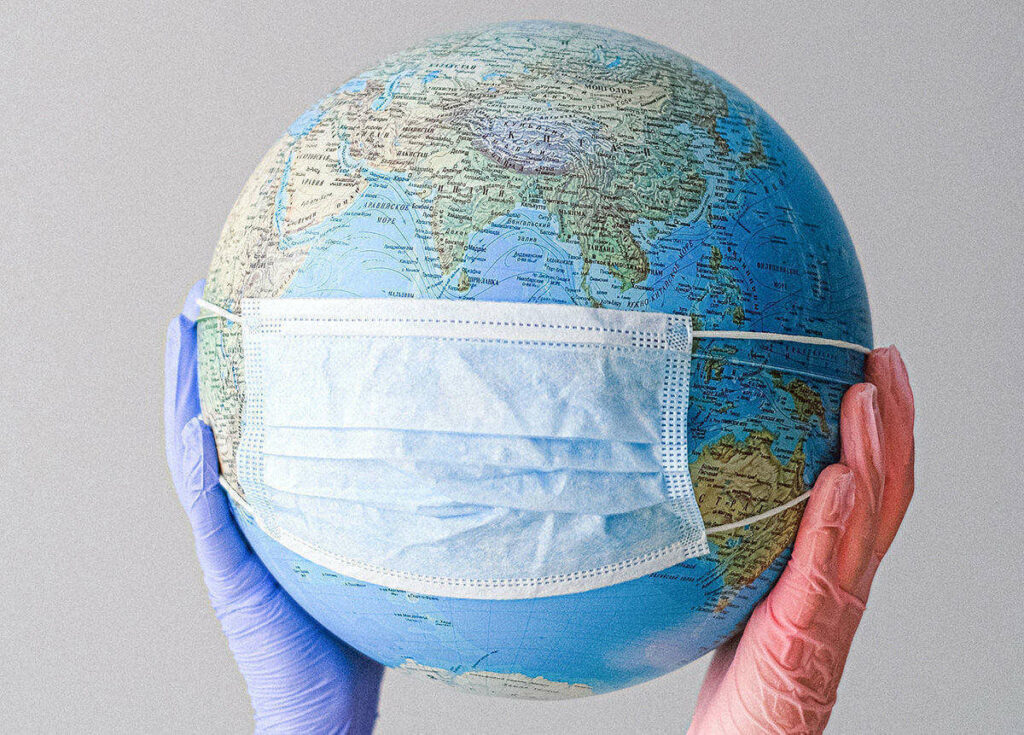COVID-19 highlights the need for deeper international collaboration from wildlife conservation to virology.
By Charles C.Y. Xu ’14
This post was submitted to the 2020 QCBS symposium essay contest / Ce post a été soumis lors du concours d’essai du colloque 2020 du CSBQ
Original post : https://magazine.nd.edu/stories/scientists-without-borders/
I was six in 1999, when I moved from Wuhan, Hubei, China to Cedar Falls, Iowa, USA — from the center of the Middle Kingdom to the heartland of America. Having grown up eating cheeseburgers and chicken nuggets with my Happy Meals in China, I distinctly remember my shock to find there were McDonald’s in the United States of America too. I am a child of globalization, a force that has connected everyone in the world in intricately interdependent ways. The same force has caused COVID-19 to spread so widely and quickly.
Wuhan was quarantined on January 23, 2020. My plans of visiting over the summer with my girlfriend to see my extended family in China went out the window. I video chatted with my grandmother in early February and the reality of the situation set in. She had been shut in her apartment for weeks, not even venturing out for groceries. She cried as she told me her best friend of over 60 years had passed away of COVID-19 after developing symptoms only 10 days prior. There was an outbreak in the small housing community where my mother grew up, and my grandmother personally knew nine people who died of COVID-19. She herself was prepared to die, too. Thankfully, she survived the outbreak and the strict quarantine, which has since been lifted. As COVID-19 spread around the world, I have since gone from worrying about my grandmother in Wuhan to my American host family grandmother in Cedar Falls, as well as my girlfriend’s grandparents who live in a nursing home in Ontario, Canada. Montreal, where I am writing, is currently under Level 4-Maximum Alert level lockdown. Viruses know no borders.
Luckily, science knows no borders either. Scientists and researchers from all over the world are racing against the clock to better understand all aspects of the SARS-CoV-2 virus and the COVID-19 disease it causes, including the origins of the virus, its genetic and molecular basis, improved detection of infection, enhanced primary care for patients. They are also developing therapies and vaccines.
The World Health Organization has developed an open database of global scientific literature on COVID-19 that contains over 100,000 articles spanning at least 26 different languages with the hopes of accelerating research and development to contain the pandemic and improve care. Many of these studies are conducted by international teams of scientists whose sustained collaboration is crucial to advancing research on COVID-19. For example, the initial description of the SARS-CoV-2 virus was authored by scientists from the Netherlands, Russia, United States, Germany, China and Spain.
Another fruitful and longstanding international collaboration exists between EcoHealth Alliance, a New York City nonprofit, and the Wuhan Institute of Virology (WIV) of the Chinese Academy of Sciences. For around 15 years, this group of researchers studied coronaviruses in bats and significantly improved our understanding of how such viruses could jump into humans by sampling wild bats, other wildlife and humans in southern China. Among many papers produced by this collaboration, these studies also produced baseline genetic sequences of bat coronaviruses, some of which were critical in the testing of the antiviral drug remdesivir.
Unfortunately, in April, the National Institutes of Health (NIH) canceled an already-funded multimillion-dollar grant for this collaboration seven days after President Donald Trump said in a press conference that “We will end that grant very quickly.” The outcry came quickly. Nearly 80 U.S. Nobel Prize winning scientists and 31 scientific societies called upon the NIH to act urgently to reconsider their decision.
Although Trump has said he has “high confidence” that the virus came from the Chinese lab at WIV, the overwhelming international scientific consensus is that SARS-CoV-2 originated naturally. The head of the lab at WIV has stated that the president’s “claim that SARS-CoV-2 was leaked from our institute totally contradicts the facts. It jeopardizes and affects our academic work and personal life. He owes us an apology.”
In a tit-for-tat fashion, the Chinese foreign ministry spokesperson Zhao Lijian has promoted the possibility, without any evidence, that the U.S. Army had planted the virus in Wuhan. As the COVID-19 pandemic rages in the U.S. amid a continuing trade war, U.S.-China relations are undergoing unprecedented stress. In a recent Pew Research poll, 73 percent of U.S. adults were found to have an unfavorable view of China. Anti-American sentiment is also commonly found across Chinese society with a poll in May showing that, on a scale of 1-10, the view of Americans had fallen a full point to 4.77 in less than a year.

The deterioration of U.S.-China relations has widespread ramifications. As United Nations Secretary-General António Guterres said in September, “Our world cannot afford a future where the two largest economies split the globe in a great fracture — each with its own trade and financial rules and internet and artificial intelligence capacities.” Regarding the pandemic, he said, “populism and nationalism have failed” and “those approaches to contain the virus have often made things manifestly worse.”
For me personally, internationalism has been a defining characteristic of my life and has played a core role in my scientific career. After finishing my undergrad in environmental sciences at Notre Dame, I pursued my masters in evolutionary biology in Netherlands, France and Sweden, and I am now doing my Ph.D. in Canada at the Redpath Museum of McGill University.
In 2018, I started a project to develop a genetic method to detect the DNA of animals from steeped alcohol, which will become a chapter of my Ph.D. thesis. Steeped alcohol is a popular form of traditional Chinese medicine that involves soaking plants and the bodies of animals in high-proof baijiu liquor. The most prized forms of steeped alcohol used endangered species like tigers, pangolins and snakes. Along with my Chinese collaborators, we hope that this forensic technology could potentially be used to monitor and combat illegal wildlife trafficking by providing law enforcement a way of checking for traces of illicit animal products.
Because of my personal connections to the COVID-19 pandemic, I have become more interested in human health aspects of wildlife conservation. Through a conference, I connected with scientists at the Bronx Zoo and the Wildlife Conservation Society (WCS). After a few emails and a video meeting, I am happy to report that I am now officially collaborating with the WCS and their Chinese counterparts on my steeped alcohol project. They have recently launched a similar initiative to develop a genetic method to identify endangered big cat species from confiscated animal products, including tiger bone wine. We will pool samples, international networks, computational resources, and molecular and bioinformatic expertise.
My interests for my postdoctoral research are shifting focus to address the crucial links between wildlife conservation and infectious diseases like COVID-19. Likely in continued collaboration with the WCS, I hope to use cutting-edge metagenomic methods to identify which animal species are more likely to harbor viruses that could spill over into human populations. Such genomic data could be used to predict which viral strains and traits are potentially more hazardous to human health, and to prioritize which wildlife species to focus on for targeted conservation efforts. This sort of research, which parallels the goals of EcoHealth Alliance and the Wuhan Institute of Virology, will help to prevent future outbreaks and another potential global catastrophe.
The war against viral pandemics will not be solved by any one individual, organization, or country. It is a global issue that will require extensive international collaboration and political unity. A fresh focus on wildlife conservation, increased investment to prevent wildlife trafficking, and further research into viral metagenomics are areas where all countries — especially the United States and China — can work toward shared goals.
A successful future will be built on solidarity, not division.
武汉加油!世界加油!Stay strong Wuhan! Stay strong world!
Charles Cong Xu is a Ph.D. candidate in the Department of Biology at the Redpath Museum at McGill University in Montreal. Visit his website charlescongxu.weebly.com or follow him on Twitter @CharlesCongXu.

0 Comments